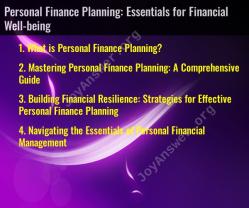How to choose a reputable credit counselor?
Choosing a reputable credit counselor is essential if you're seeking assistance with managing your debt and improving your financial situation. Here are some tips and guidelines to help you select a reputable credit counselor:
Check Accreditation and Certification:
- Look for credit counseling agencies that are accredited by a recognized organization, such as the National Foundation for Credit Counseling (NFCC) or the Financial Counseling Association of America (FCAA). Accreditation ensures that the agency adheres to industry standards and best practices.
Licensing and Compliance:
- Verify that the credit counseling agency is licensed to operate in your state. Ensure they comply with state and federal regulations governing credit counseling and debt management services.
Experience and Reputation:
- Research the agency's history and reputation. How long have they been in business, and what do previous clients say about their services? Look for reviews and ratings online to gauge the agency's credibility.
Nonprofit Status:
- While a nonprofit status doesn't guarantee quality service, many reputable credit counseling agencies operate as nonprofit organizations. They are typically more focused on providing assistance to consumers rather than generating profits.
Free Initial Consultation:
- A good credit counseling agency typically offers a free initial consultation. During this session, they should assess your financial situation, discuss your goals, and provide an overview of their services without charging a fee.
Transparency and Fees:
- Understand the agency's fee structure. Reputable agencies are transparent about their fees, and these fees should be reasonable. Be cautious of agencies that request upfront fees before providing any services.
Services Offered:
- Determine the range of services offered. Credit counseling agencies may provide services beyond basic budgeting and debt management, such as housing counseling, bankruptcy counseling, and education on financial literacy.
Qualified Counselors:
- Ensure that the counselors are trained and certified by recognized organizations. They should have a strong understanding of financial management, budgeting, and debt relief options.
Personalized Financial Plan:
- A good credit counselor will work with you to create a personalized financial plan tailored to your specific needs and goals. The plan should address your debt issues and provide actionable steps for improvement.
Confidentiality:
- Your financial information should be treated with the utmost confidentiality. Confirm that the agency has secure procedures in place to protect your personal and financial data.
Education and Support:
- Look for an agency that not only helps you with your current financial challenges but also provides educational resources and ongoing support to help you build better financial habits.
Red Flags:
- Beware of agencies that make unrealistic promises, pressure you into making decisions, or engage in unethical practices. If something feels off, it's best to seek help elsewhere.
Communication:
- Assess the quality of communication and the agency's responsiveness. A good credit counselor should be approachable, attentive to your questions and concerns, and provide timely responses.
Before making a decision, it's advisable to consult with multiple credit counseling agencies to compare their services, fees, and approach. Take your time to choose an agency that aligns with your financial goals and is committed to helping you achieve a healthier financial future.
Selecting a Reputable Credit Counselor: What to Consider
Choosing a reputable credit counselor is crucial for effective financial guidance and support. Here are some key factors to consider:
Qualifications and Accreditations: Opt for credit counselors certified by reputable organizations like the National Foundation for Credit Counseling (NFCC) or the Association of Independent Credit Counseling Agencies (AICCA). These certifications ensure adherence to ethical standards and expertise in financial counseling.
Areas of Expertise: Assess the counselor's specialization in dealing with your specific financial concerns, such as debt management, credit repair, or budgeting assistance.
Communication Skills and Rapport: Choose a counselor who can clearly explain complex financial concepts, actively listen to your concerns, and establish a comfortable rapport for open communication.
Fees and Services: Understand the counselor's fee structure and the services offered. Ensure the fees are transparent and align with your budget.
Availability and Accessibility: Consider the counselor's availability for in-person or online sessions to suit your schedule and preferences.
Qualities and Credentials of a Trustworthy Credit Counselor
A trustworthy credit counselor should possess the following qualities and credentials:
Certifications: Certification by reputable organizations like NFCC or AICCA indicates adherence to ethical standards and expertise in financial counseling.
Experience: Years of experience in credit counseling demonstrate the counselor's knowledge and ability to handle various financial situations.
Training and Education: Ongoing training and education ensure the counselor stays up-to-date with financial regulations, counseling techniques, and industry trends.
Professional Memberships: Membership in professional organizations like the Financial Counseling Association of America (FCAA) demonstrates commitment to professional development and ethical practices.
Positive Client Reviews: Check online reviews and testimonials from past clients to gauge the counselor's effectiveness and client satisfaction.
Researching and Verifying the Reputation of Credit Counselors
Before selecting a credit counselor, conduct thorough research to verify their reputation and credentials:
Check Online Presence: Visit the counselor's website and social media pages to assess their professionalism, client testimonials, and services offered.
Verify Certifications: Check with the NFCC or AICCA to confirm the counselor's certification status and validity.
Consult with Financial Organizations: Ask your bank, credit union, or financial advisor for recommendations or referrals to reputable credit counselors.
Read Consumer Reviews: Review online forums, consumer protection websites, and Better Business Bureau (BBB) reports to assess the counselor's reputation and client feedback.
The Importance of Professional Ethics in Credit Counseling
Professional ethics are paramount in credit counseling, ensuring that clients receive fair, unbiased, and confidential advice. Ethical credit counselors adhere to the following principles:
Confidentiality: Protect client information and maintain privacy throughout the counseling process.
Transparency: Clearly explain fees, services, and potential outcomes, avoiding misleading or unrealistic promises.
Non-judgmental Approach: Treat clients with respect and empathy, understanding their financial challenges without judgment or bias.
Conflict of Interest Avoidance: Disclose any potential conflicts of interest and avoid recommending products or services that benefit the counselor personally.
Continuous Improvement: Continuously update knowledge and skills through training and professional development to provide the best possible guidance.
Red Flags to Watch for When Choosing a Credit Counselor
Beware of these red flags when choosing a credit counselor to avoid potential scams or unethical practices:
Excessive Upfront Fees: Avoid counselors demanding large upfront fees before providing any services. Legitimate counselors typically charge fees based on services rendered.
Unrealistic Promises: Be wary of counselors who make unrealistic promises of quick credit repair or guaranteed debt elimination. Genuine counselors focus on long-term financial solutions and realistic expectations.
Pressure Sales Tactics: Avoid counselors who pressure you into signing contracts or making hasty decisions. Reputable counselors allow ample time for consideration and informed decision-making.
Lack of Transparency: Be cautious of counselors who are vague about fees, services, or potential outcomes. Reputable counselors provide clear and upfront information.
Unprofessional Conduct: Avoid counselors who display unprofessional behavior, such as poor communication, lack of empathy, or disregard for your concerns.












